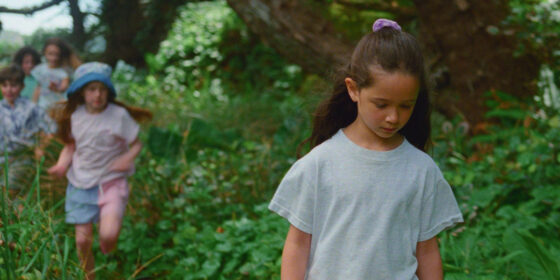TIFF 2023 | Seagrass (Meredith Hama-Brown, Canada) — Discovery

By Gabrielle Marceau
If you’re one of those people who’s gotten hooked on Showtime’s Couples Therapy or podcasts like Esther Perrel’s Where Should We Begin, you’re accustomed to the arduous but rewarding process of working through a relationship’s Gordian knots and the incredible breakthroughs when patterns are broken, defences are shed, and connections restored (at least for a time). Seagrass offers none of this. The film (the first by director, Meredith Hama-Brown) follows a family in crisis; the parents have brought their two daughters to a remote retreat on the Pacific Coast where they’ll attend group couples therapy while the kids are basically at summer camp. The marital strife has seeped into their daughter’s psyches, particularly 6-year-old Emmy (Remy Marthaller) who retreats into a world of magical talismans (a purple pool toy) and ghost stories (an urban legend about a cave which revives the dead). The dead being risen here is Emmy’s maternal grandmother who passed recently, a loss that was also the catalyst for Judith (Ally Maki) to reevaluate her marriage.
Hama-Brown based the characters on her own parents (she also has a white father and a Japanese-Canadian mother), not the discord they actually had, but one which she’s imagined (or perhaps intuited). Cultural differences are at the heart of Steve (Luke Roberts) and Judith’s conflict; he doesn’t respect her upbringing and her parent’s trauma translates into repression and duty, a pattern she repeats. Although Seagrass is a family drama, it’s full of fashionable ambient dread: there are eerie, high-angle floating shots from the perspective of an imagined ghost and foreboding images of crashing waves and yawning caves. Do these horror-esque interludes pay off? Not exactly. But the film is evocative enough to keep you guessing, and it has a surprisingly bleak ending, one that doesn’t loosen the massive knot of marriage but slices it right in half.
Gabrielle Marceau

